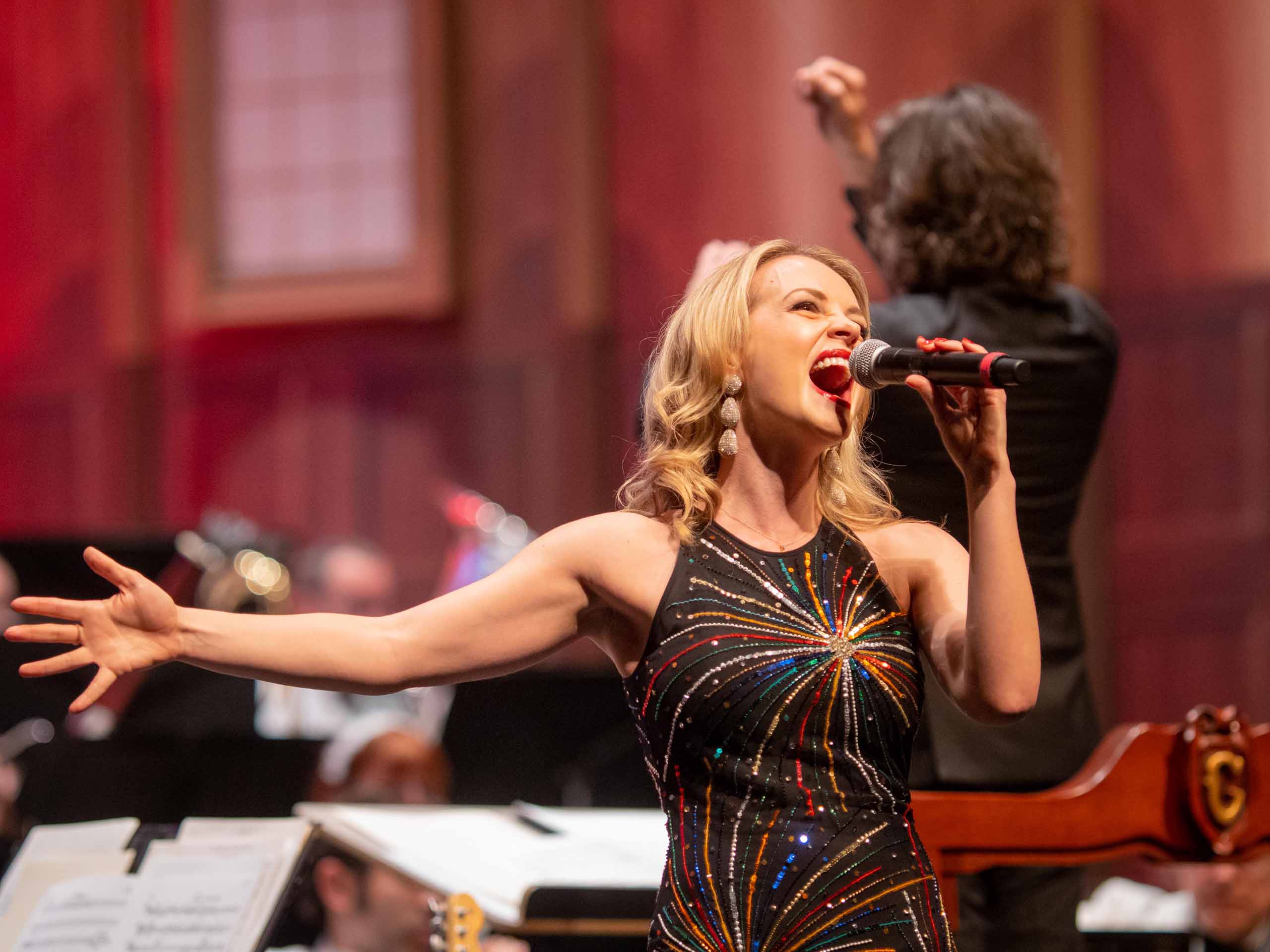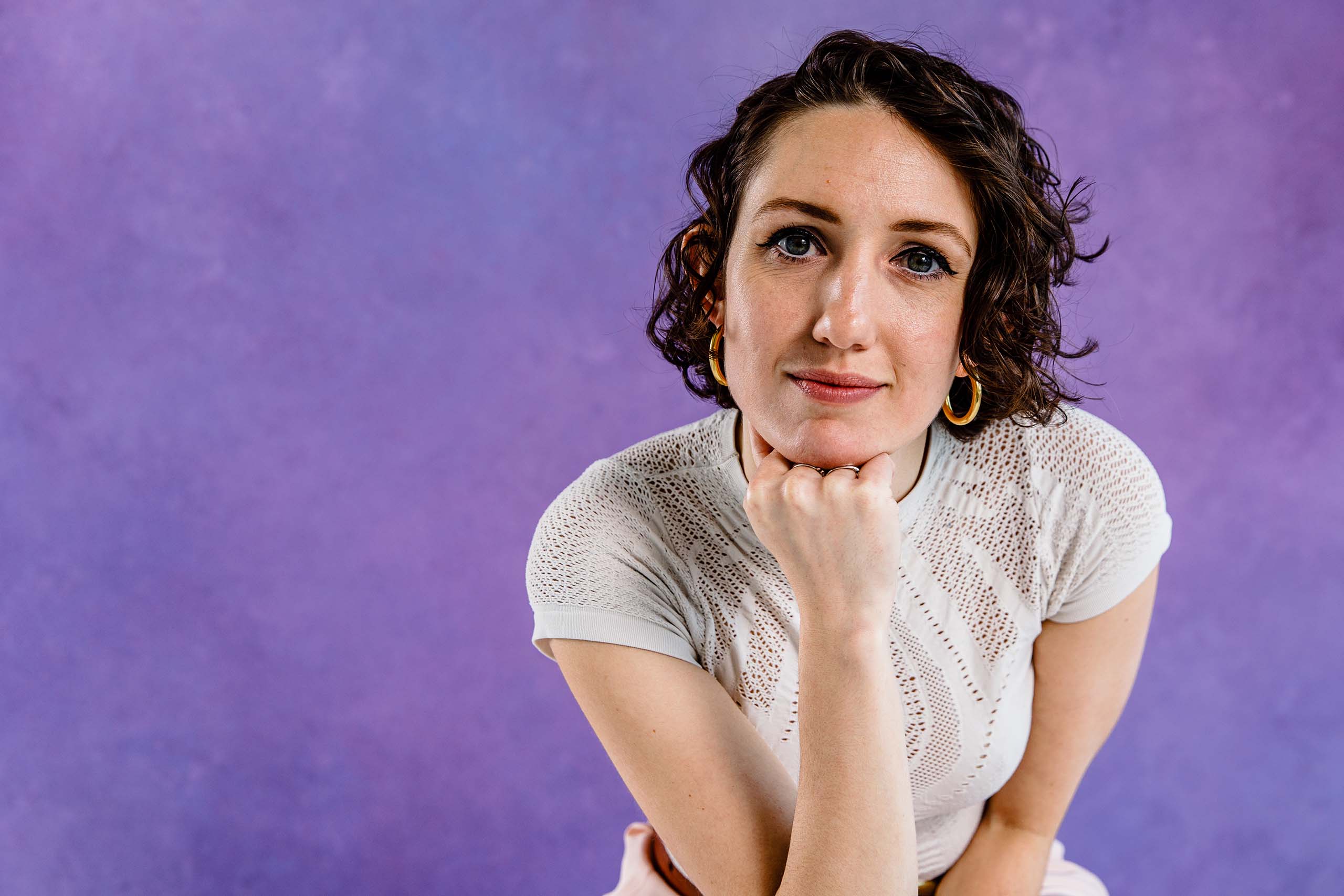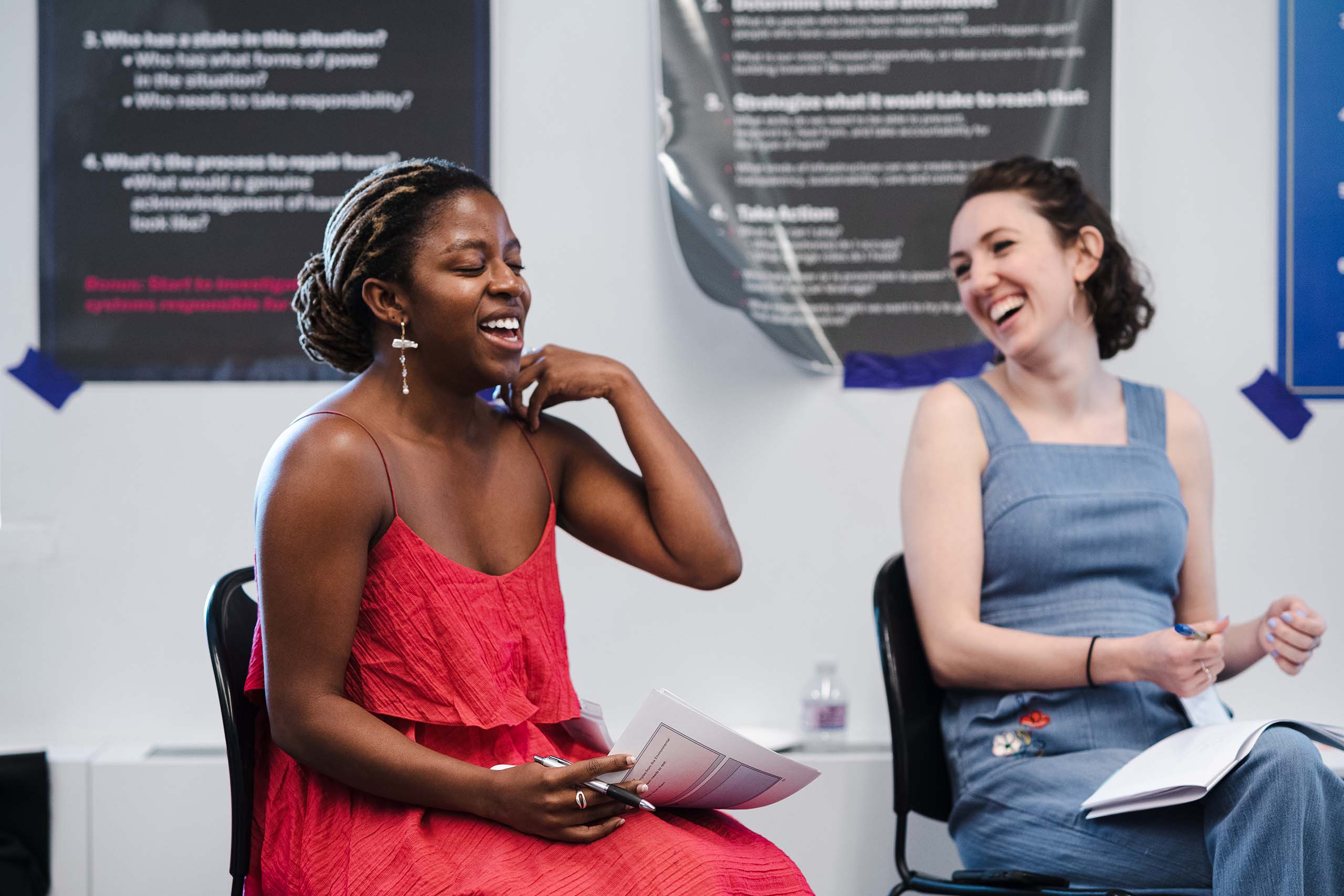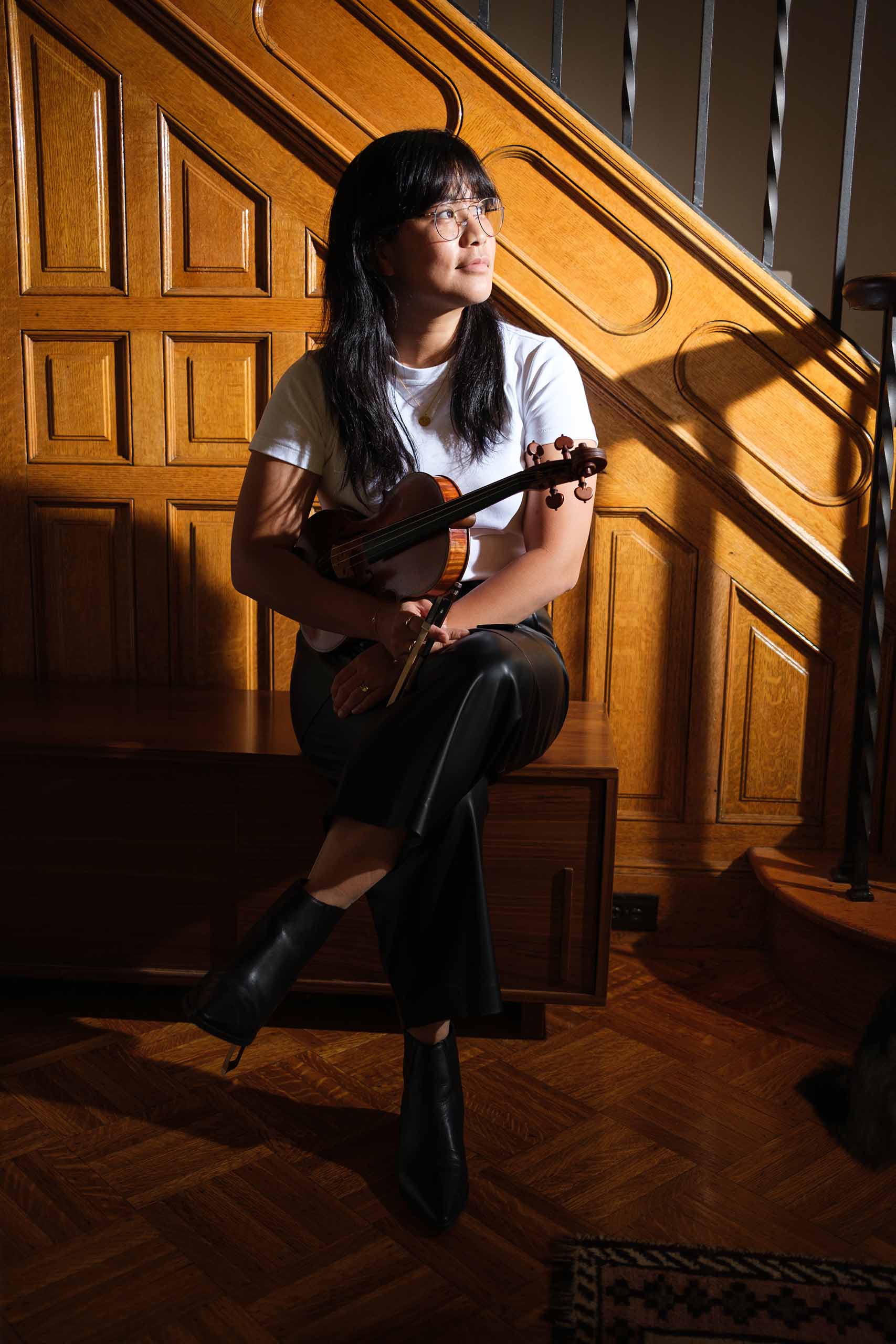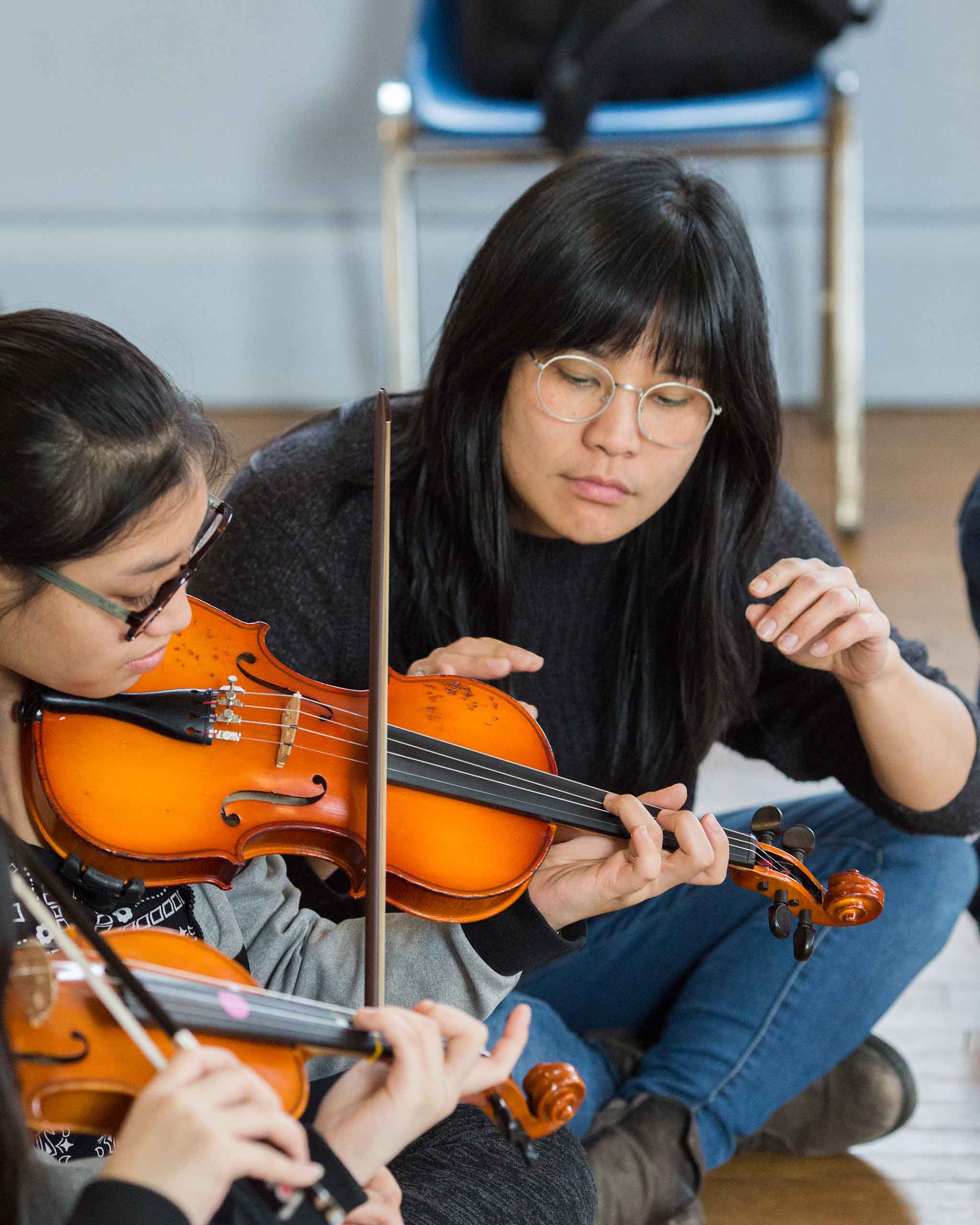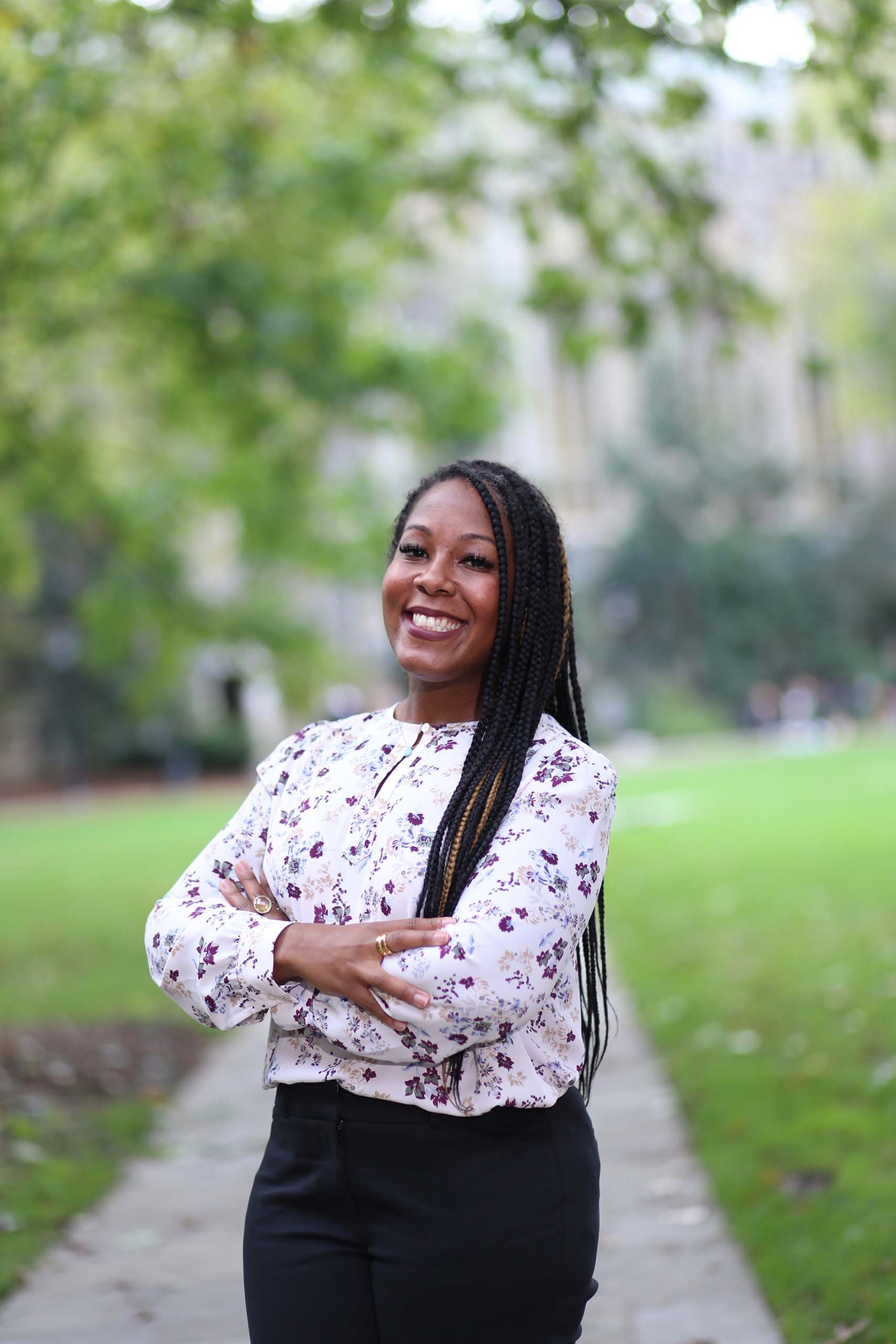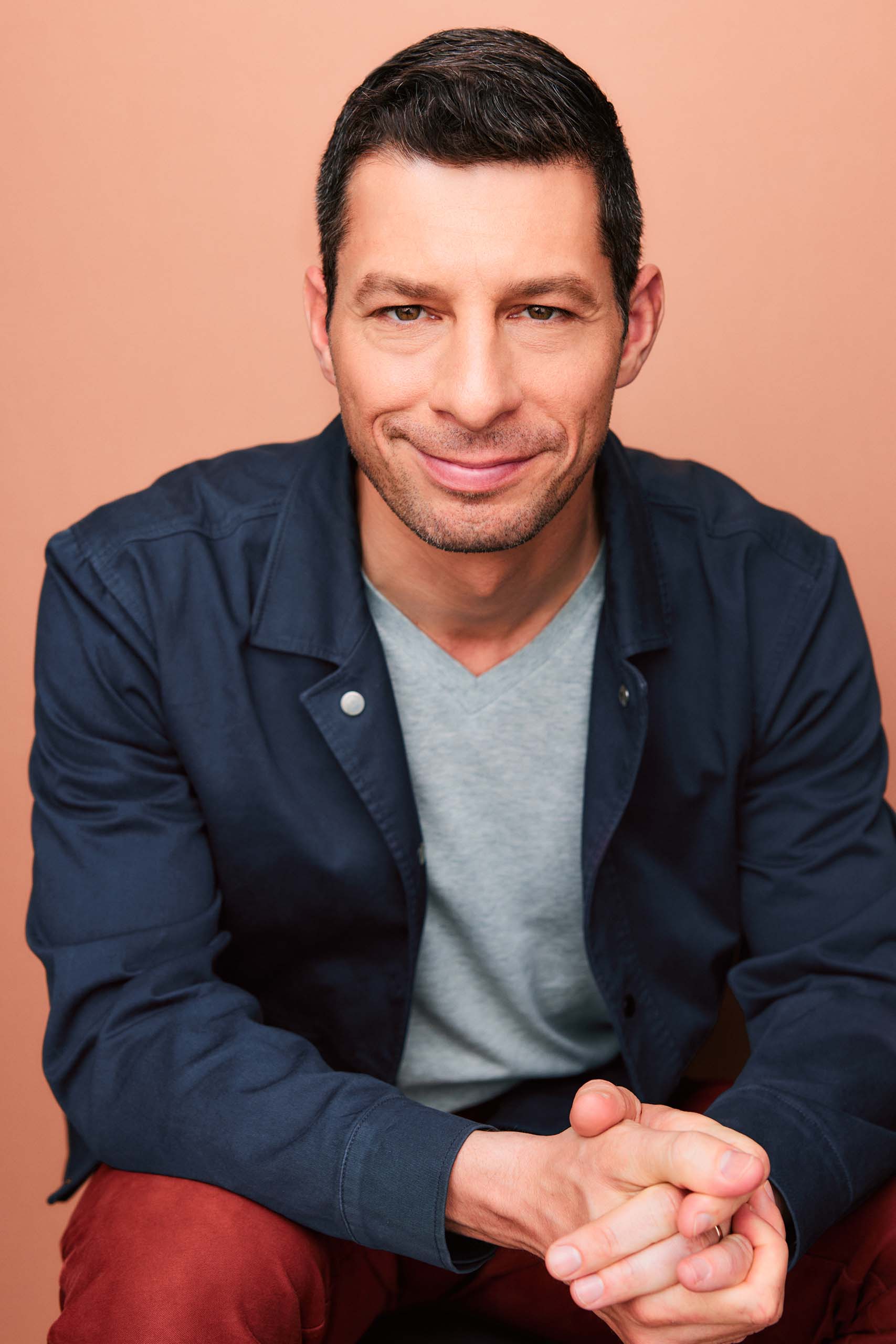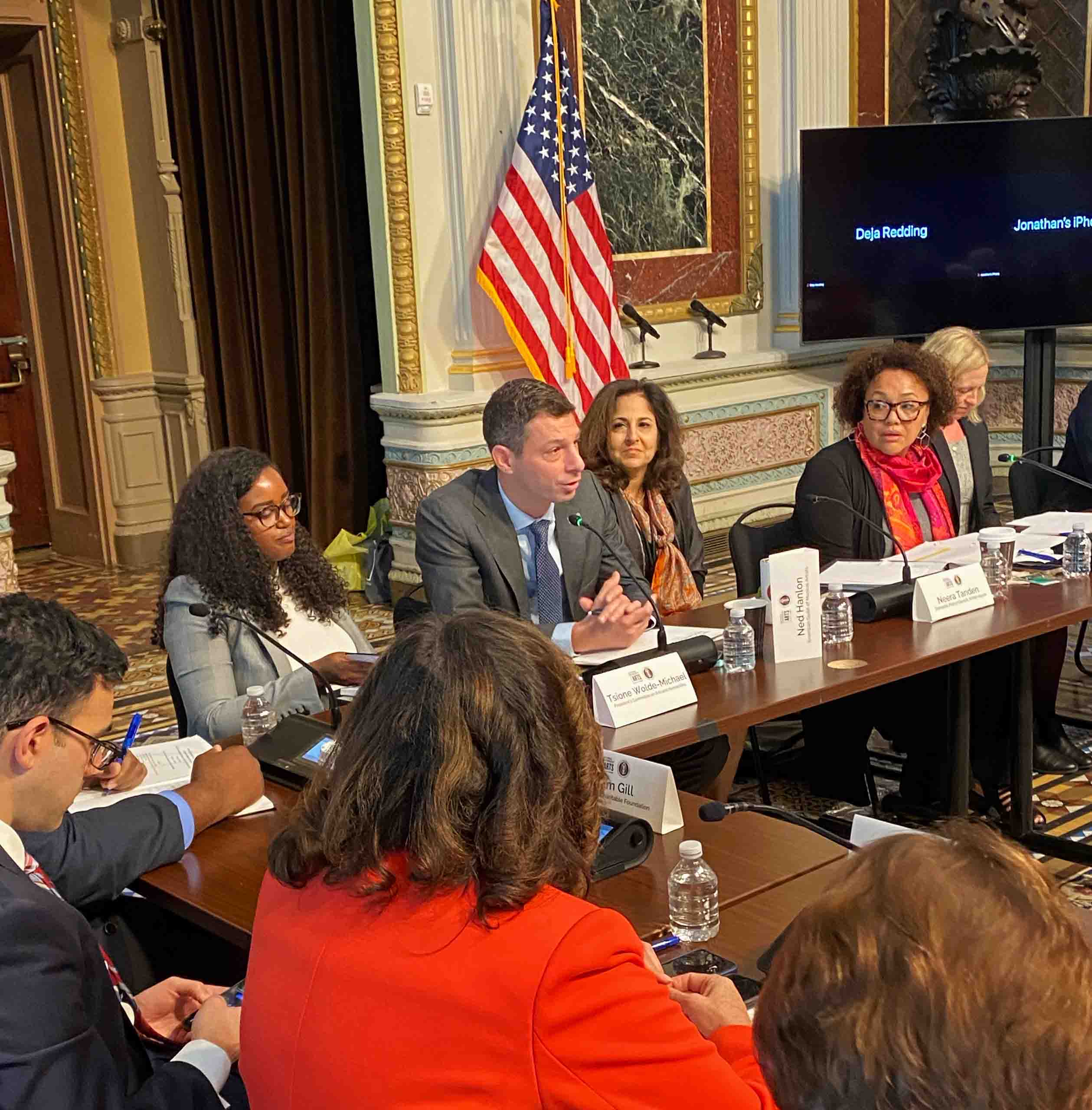Michigan Muse Winter 2024 > Alumni Volunteer Service and Advocacy
Orchestrating Change: SMTD Alumni Transform Lives and Enrich Communities through Volunteer Service and Advocacy
By Claudia Capos
From the grand concert halls and Broadway stages of New York City to the regional theatres and musical venues in the Midwest and beyond, SMTD alumni are carving out professional careers across a broad spectrum of the performing arts.
Offstage and out of the spotlight, many graduates also are devoting considerable time and talent to fostering arts appreciation in local communities, mentoring young performers, and advancing pressing social issues.
Some SMTD alumni have launched youth orchestras and brass ensembles in underrepresented neighborhoods. Others have taken leading roles in community efforts to reduce racism and violence. Still others have created innovative ways to use the arts as a healing force.
“When you are training at the highest level in performance, the focus is very much on yourself all the time,” observed Christina Maxwell (BFA ’16, musical theatre), who combined her studies in musical theatre with volunteer work as an arts therapist for young cancer patients. “In order to get a performance that moves and changes people, you must be connected with the suffering and stories of those outside yourself.”
This dual focus on performance excellence and community enrichment has long been a hallmark of SMTD. “Dedication to civic engagement is woven into the culture at SMTD,” said David Gier, Dean and Paul C. Boylan Collegiate Professor of Music. “It is fostered by the important work being done by our faculty and staff, but it is driven in large part by our students. I am continually impressed and inspired by SMTD students’ commitment to making the world a better place, and they display that commitment long after they leave this school.
“Our alumni have a deep desire to work beside and advocate for their communities and to share their considerable energy and creativity in service to that goal,” Dean Gier continued. “I have no doubt that their socially engaged practices enrich their communities as well as having a profound impact on their own artistry.”
Laying the Groundwork at SMTD
Like many SMTD alumni, Maxwell laid the groundwork for her lifelong community service work during her student days on the Michigan campus. As an undergraduate, she founded Music at Mott, a university-sanctioned program at C.S. Mott Children’s Hospital that brought music and healing to patients and families.
After graduation, Maxwell pursued a professional singing career in New York City. She also worked with the nonprofit group RipRap for four years to provide one-on-one music and art therapy for young cancer patients and their families in underserved parts of the city. “It has always been important to me as a person, and because of my faith, to make sure I am giving back,” said Maxwell, who currently performs as a soloist in concerts worldwide and advises the global real estate firm, Related Companies, on its art acquisitions and strategic cultural partnerships.
Brendan Ryan (BFA ’21, dance) made Michigan history by becoming the first male dancer to join the U-M dance team in 2017. Through Michigan Athletics, he and other team members took part in many community service events, including entertaining sick children at Mott Children’s Hospital.
Shortly after graduating in May 2021, Ryan landed a coveted position as a Los Angeles Rams cheerleader and moved to Los Angeles. The Rams football team is committed to community outreach, so he has continued to give back to the southern California community. “I’ve done over 150 community events with the Rams – everything from readings at schools and visiting hospital patients, to doing food and toy drives for Los Angeles families and teaching dance clinics,” said Ryan, who is a professional choreographer and dance instructor during the off season. “I’ve also traveled internationally with the Rams to visit US military bases in Korea and Japan and to teach dance to military families.”
Brendan Ryan performs on the sidelines at a matchup versus the Philadelphia Eagles and volunteers at a local elementary school with other LA Rams cheerleaders. Photo credit: Los Angeles Rams
During Super Bowl weekend, NFL teams, including the Rams, typically send football stars and cheerleading teams to overseas bases to entertain and watch the Super Bowl with American service members who are away from their families. The Los Angeles Rams also has been an NFL trailblazer in supporting the LGBTQ community and partnering with the Varsity Gay League, a California-based recreational sports organization. Ryan recently performed in the City of West Hollywood Pride celebration. “These experiences have literally changed my life for the better – forever,” he said.
Driving Social Change through “Artivism”
Leia Squillace (BTA ’17, theatre arts), the co-director of programming of the Tony Award-winning nonprofit Broadway Advocacy Coalition (BAC), traces her passion and preparation for community activism and organizing back to SMTD. As a theatre arts student, she participated for several years in the U-M Prison Creative Arts Project. “I had the opportunity to teach theatre in a women’s prison in southeast Michigan,” Squillace related. “That was my inflection point of recognizing that my artistic work could not be separated from my advocacy work – that those two things always had to be intertwined.”
Squillace honed her “artivism” skills, which integrate artistic strategies into advocacy activities, on the Michigan campus and in the Detroit community. Drawing on theatrical principles, she created and performed in short skits about campus-wide issues for the U-M Office of New Student Programs and trained student volunteers at the U-M Sexual Assault Prevention and Awareness Center (SAPAC). Off campus, she taught HIV prevention and worked to reduce school violence in Detroit.
Leia Squillace (right) and Indigo Sparks facilitate Broadway Advocacy Coalition’s Change Agent Training, an introductory workshop to community organizing for workers in the theatre industry. Photo credit: Marcus Middleton
Since 2019, Squillace’s professional role as a producer of new works at BAC has focused on issues facing those who are or have been incarcerated, such as expanding housing and job opportunities for people with criminal records. She also developed the coalition’s Reimagining Equitable Productions program to help theatre companies address racial equity within working spaces and production.
In addition, Squillace teaches artivism methodology at Columbia University’s law school, where she is a lecturer. “I don’t see social impact work as separate from artistic work,” she remarked. “At BAC, we produce art that is deliberately focused on having a social impact, so audiences are motivated to take action around a particular issue.”
Improving Access to Music Education
Violinist Yuki Numata Resnick (MM ’06, violin, chamber music) rode the crest of international success during the early years of her career. She played chamber music in venues around the globe, performed as a soloist at the Sydney Opera House, and toured with Jóhann Jóhannsson, an award-winning Icelandic composer, musician, and producer. Numata Resnick also played with, and recorded for, well-known bands such as the National and Arcade Fire and, more recently, artists such as Taylor Swift and Ed Sheeran.
“I had the incredible privilege of being a violinist who had the opportunity to travel the world and play with amazing musicians,” Numata Resnick said. “But while I was doing that work, I felt there was more that music could do.”
The transformative power of music surfaced after she moved to Buffalo in 2013 to take a tenure-track position as assistant professor of violin and viola at the University at Buffalo. “At the time, I thought this would be my forever career, and I was eager to offer music students the incredible opportunities and experiences I had at the University of Michigan,” Numata Resnick recalled. But she and her colleagues soon perceived a worrisome gap in their community.
“We saw that the Buffalo public schools were not prioritizing music education,” she said. “As educators and musicians, we knew how transformative access to music at an early age could be.” To fill that gap, Numata Resnick and two other musicians co-founded Buffalo String Works in September 2014. The music program, which supports leadership development and social change, initially served the refugee community in Buffalo. Under Numata Resnick’s leadership as executive director from 2019 to 2023, it expanded rapidly to reach more than 150 refugee, immigrant, and historically marginalized youth. “Working with families at Buffalo String Works allowed me to see how impactful and transformative music could be for an immigrant family,” Numata Resnick remarked. “It also solidified for me what music can do for a community.”
At the same time, she recognized that school and governmental systems often limit access to music and arts education, especially for underrepresented and minority groups. To address this systems-level problem, Numata Resnick accepted a new position as director of arts and culture at the Community Foundation for Greater Buffalo in 2023. “I hope to take down some of the silos in society that prevent arts access,” she said. “I also want to open conversations across our community that can lead to healing, so we can all move forward together.”
Bridging Academy and Community
On the Rutgers University campus in New Brunswick, New Jersey, Marjoris Regus (PhD ’22, music education), an assistant professor of music education, is drawing on her SMTD experiences to create innovative arts education and participation programs that bridge academy and community.
“At SMTD, I worked closely with Robin Myrick (BFA ’89) and the Engagement & Outreach team in Michigan’s Success through Artistry & Readiness program, also known as M-STARs,” Regus said. “We partnered with two Ann Arbor schools where we provided additional private and group music lessons to build a college-going culture for young musicians underrepresented in arts higher education.” While at U-M, Regus also expanded her own understanding of different music pedagogies, and she conducted research on hip-hop music in London and Germany through LSA’s Center for World Performance Studies. “We learned to look analytically at performance practices through a global lens,” she explained.
Now in her second year of teaching at Rutgers, Regus is leveraging these lessons and putting her own spin on them. At the top of her project playlist is the development of an intercollegiate symposium focused on global hip-hop artists and music. “The symposium centers hip hop as a framework for education and encourages Rutgers students, New Brunswick community members, and K-12 educators to explore how hip hop is embodied in different forms around the world,” she said. “We want to bring life to this genre, which is observing its 50th anniversary and has become a global art form.”
Reflecting her family’s roots in the Dominican Republic, Regus has been researching reggaeton music, a Spanish-style hip hop that emerged from Panama and has exploded across Central and South America, the Caribbean, and the US. She also is helping to forge an international partnership that engages the Departments of Music Education and Dance at the Rutgers Mason Gross School of the Arts with a performing arts school in Brazil. The exchange will broaden the musical horizons of students at both schools and cultivate a greater appreciation for alternative forms of music and music-making.
“As music educators, we have a big responsibility to consider music that’s happening locally and around the world to ensure we are being responsive to our community’s wants and learning from local artists,” Regus said. “I try to give my students opportunities to interact with the community and experience music-making outside their own musical bubble.”
Ensuring a Brighter Future for Performing Artists
The performing arts took it on the chin during the 2020–21 season when the COVID-19 pandemic forced concert halls and theatres to cancel their performances, throwing countless artists and stagehands out of work.
The dire situation prompted Ned Hanlon (MM ’08, SM ’10, voice) – a member of the Metropolitan Opera Chorus since 2014 and the American Guild of Musical Artists (AGMA) since 2009 – to do some soul-searching. “I stepped back and took a broader look at the industry at large,” said Hanlon, who chaired AGMA’s contract negotiations with the Metropolitan Opera in 2018 and 2021. “I started to see the issues we were dealing with on a contract level as symptoms of overall issues within the performing arts.”
In Hanlon’s view, the power balance in the arts is out of whack. Artists, who should be the center of conversations about the arts, are not treated equitably and often face harassment and discrimination. “We live extremely precarious lives without much stability, not knowing where the next paycheck is coming from or what our health insurance and retirement benefits will be,” he said. “Frequently, artists don’t feel free to speak up, because they are afraid of getting fired or not getting hired again. I looked at ways the union could help.”
Hanlon’s resolve cast him in a new series of roles at AGMA, which represents 6,000 singers, dancers, and staging staff members. In 2021, he was elected to the union’s board of governors, and two years later, in June 2023, he became AGMA president. “We’re focused on finding ways to empower artists to advocate for themselves and giving them the resources and support to accomplish that, both inside and outside the union,” Hanlon explained.
In addition to his elected position, Hanlon is the founder of the AGMA Opera & Concert Choristers Caucus and Met Chorus Artists Inc., a nonprofit that raised nearly $750,000 to support out-of-work artists during the pandemic.
In retrospect, he credits his experiences at U-M and SMTD for preparing him to take on a dual role as a performing artist and an artists’ rights advocate. “At U-M, I was exposed to a lot of different ideas and received a well-rounded education,” Hanlon remarked. “I also built sets in the Walgreen Drama Center as a work-study carpenter, which gave me another perspective on the industry.”
In October 2023, Hanlon attended a high-level meeting at the White House – hosted by the National Endowment for the Arts and the White House domestic policy advisor, Neera Tanden – to discuss the future of arts funding. He stressed the importance of supporting working artists as well as arts organizations in any final decisions. “This was exciting for me,” Hanlon said. “It was good to make sure that artists had a voice at the table.”



